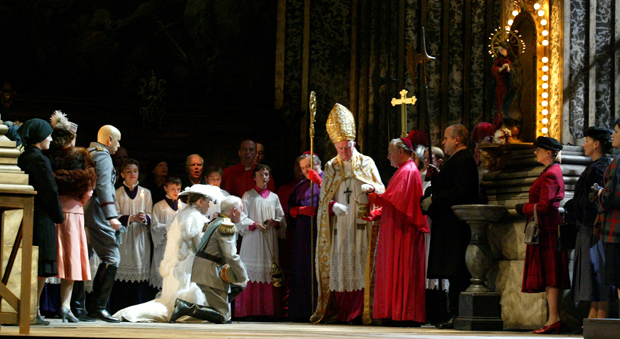Showing @ Festival Theatre, Edinburgh until Wed 23, Fri 25, Sun 27, Thu 31 May & Sat 2 Jun
This is the eighth time in thirty two years that Scottish Opera have staged Anthony Besch’s production of Tosca, so no-one should doubt its popularity with audiences; however it is beginning to show signs of age. The staging is flat, and with modern audiences used to movement (and multi-layered, high tech backgrounds), the static tableaux and gilt columns can feel a little claustrophobic.
More optimistically, the accuracy and opulence of Peter Rice’s sets and costumes lend the production a bit of authenticity and atmosphere, and the transfer from its Napoleonic setting to the pomposity and paranoia of the Fascist era is still an inspired concept. But ultimately Tosca is an opera that’s contained in the actual performance and Puccini’s euphonious music. You could set it in a fridge factory in Birmingham and it would still be impressive so long as the voices and drama carried the day.
Vocally, this is a winning production; Susannah Glanville’s Tosca is a joy of soaring cadences: denouncing, pleading and full to the brim of anguish and love. Glanville combines her tunefulness with fine acting; it might be impossible to give a subtle interpretation of the passionate diva, but she still resists using the character’s temperamental nature to go over the top.
José Ferrero, making his Scottish Opera début along with Glanville, is a superlative tenor, in possession of a powerful voice and more than capable of interpreting Puccini’s full bloodied arias. But as an actor he is stiff and starchy, never convincingly inhabiting the role of Cavaradossi: the angry, rebellious, atheistic young painter who Tosca loves.
Tosca possesses one of the great operatic villains in Baron Scarpia and only the good manners of the audience prevent him from being hissed upon his entrance. Robert Poulton makes a very hiss-able Scarpia indeed: pompous, preening, practically licking his lips every time he sees Tosca. Poulton’s baritone is perfect for carrying both Scarpia’s authority and for his syrupy seduction of techniques.
Whilst this production doesn’t require anything flashy from Jonathan Cocker, the débutant revival director still does a fine job of running things, particularly in adding a sense of colour and fun to the crowd scenes. In its fourth decade and having been revived across the world, this version of Tosca clearly still has something to offer. Whilst perhaps there’s room for a new interpretation to take the stage, classics become classics for a reason.


Comments